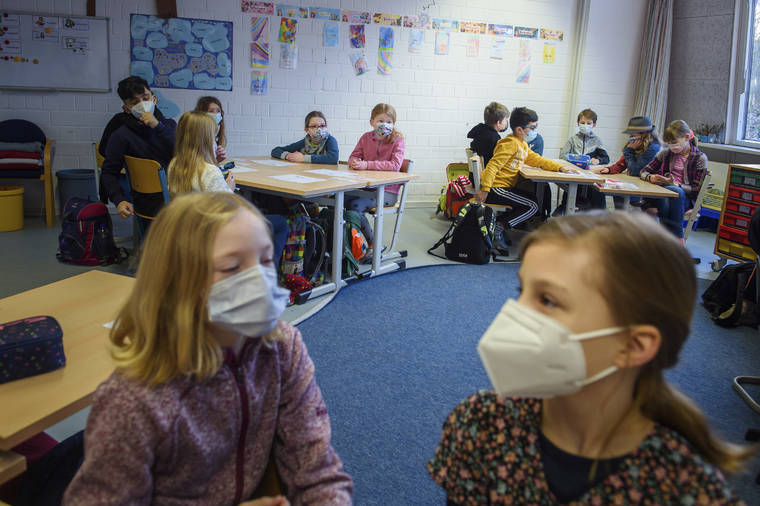BERLIN — Elementary students in more than half of Germany’s 16 states returned to school Monday after more than two months at home, the first major relaxation of the country’s pandemic measures since before Christmas.
Kindergartens also reopened their doors for pre-school children, giving much-anticipated relief to stressed parents trying to juggle working from home and childcare during the lockdown.
The move was agreed at a meeting between German Chancellor Angela Merkel and state governors two weeks ago, and stuck to despite signs that the decline in case numbers seen in the country is flattening out again and even rising in some areas.
Education Minister Anja Karliczek has defended the decision to reopen schools, saying younger children in particular benefit from learning together in groups.
Schools should use “all available means to prevent virus transmission,” Karliczek told German news agency dpa, expressing confidence that state education officials who are in charge of school matters in Germany would consider the infection numbers when deciding where to reopen.
Germany’s disease control agency says there were 4,369 newly confirmed cases and 62 deaths in the past day, though Monday’s numbers are often low due to reporting delays at the weekend.
The spread of more contagious virus variants has caused particular concern in Germany.
Government spokesman Steffen Seibert noted that a recent review of positive tests found that the variant first detected in Britain is now present in almost a quarter of all cases.
“In general, experts expect that … the next measurement will result in a higher figure,” he told reporters in Berlin.
Elementary school students in Berlin and elsewhere are required to wear masks in class and some will continue to do part of their schooling from home, to help reduce class sizes. Officials have pledged to install air filtration devices in all classrooms. So far that effort hasn’t progressed very far and teachers instead have to regularly open windows to avoid stale, potentially virus-laden air from building up.
Education officials and Germany’s health minister agreed Monday that teachers in primary and special needs schools, and kindergarten staff, will be given greater priority in getting vaccinations.
The governor of Bavaria said Monday that Germany should aim to do rapid testing of 1 million people each day, in addition to the hundreds of thousands of regular PCR tests conducted daily. Markus Soeder also announced that his southern state, which has seen a sharp rise in cases in some counties on the border with the Czech Republic, will reopen flower and gardening stores Monday.
Officials have already agreed to let hairdressers nationwide reopen on March 1.
A prominent German doctor warned against relaxing the lockdown further at the moment, citing the so-called R-number that shows how many people each person with COVID-19 infects. The number has increased to 1.1, indicating an upward trend in cases.
Frank Ulrich Montgomery, the chairman of the World Medical Association, told the Funke media group that it was “absolutely irresponsible” to talk about easing the lockdown at this stage.
German officials say they are discussing with their French counterparts this week whether to impose further restrictions on the border between the two countries due to high numbers of infections on the French side.
Earlier this month, Germany introduced a requirement that travelers from the Czech Republic and Austria’s state of Tyrol produce negative test results before they can cross the German border.
———
Follow all of AP’s pandemic coverage at:
https://apnews.com/hub/coronavirus-pandemic
https://apnews.com/hub/coronavirus-vaccine
https://apnews.com/UnderstandingtheOutbreak


